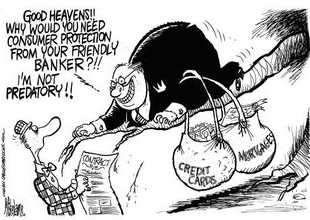The Bank Lobby Gets Desperate on Derivatives

Astonishingly, as Wall Street reform enters its final hours a tired, generic corporate refrain against regulation is gaining traction. As bigwig bankers and their lobbyist brethren fight to defeat tough new rules on derivatives—the crazy casino that brought down AIG—all their sloganeers can come up with is the trite wail that serious rules will send this risky business overseas. It’d be funny if members of Congress weren’t taking it seriously.
“Oh no—the business will go overseas!” is the last-ditch, we’re-about-to-lose-this-one cry of despair for corporate executives in every industry. Crack down on a profitable abuse in the United States, and the entire business will move to London or Mumbai, sending jobs and tax revenue abroad with it– or so the argument goes. You only hear this line when CEOs know they have no case, and have to divert attention away from the real substance of the policy debate. In the case of Wall Street abuses, this nonsense is especially ridiculous. The bank lobby really just doesn’t have any good arguments to launch in its favor, so it’s falling back on generic corporate jargon.
In reality, the U.S. has extremely broad authority to crack down on derivatives activity abroad, we just don’t have a whole lot of good rules on derivatives for regulators to enforce. It’s extremely difficult for financial institutions to simply offshore their risky derivatives business to avoid oversight. Under current law, the Commodity Futures Trading Commission has the authority to regulate any trading done by foreign firms on behalf of U.S. clients, any trading of U.S. assets conducted by foreign institutions and any trading that causes a “substantial disruption” in U.S. markets. Just about anything the CFTC wants to get its hands on, it can, and the current CFTC Chairman, Gary Gensler, is a committed reformer. We just need to write good rules for his agency to enforce.
Moreover, finance tricksters will have no incentive to move their destructive derivatives trading abroad, because the rules in other countries are, in fact, much tougher than those the U.S. is currently considering.
There are a lot of ways to crack down on Wall Street, but none of them will work without reining in the insane, secretive market for derivatives—speculative instruments that allow financiers to gamble on anything from subprime mortgages to the price of corn. Right now Wall Street is making a big push to roll-out new derivatives on movie box-office receipts, allowing the financial world to place raw bets on how much money a movie is going to make. It sounds crazy and destructive, and it is.
Germany is leading the way on derivatives reform by simply banning this kind of naked gambling outright. The U.S. effort is critically important, but much more modest. Instead of banning the casino, reformers in Congress are hoping to shrink it by ending the taxpayer subsidies that fuel it. This is at the heart of the proposal from Sen. Blanche Lincoln, D-Ark., that has earned so much ire from the bank lobby. Bankers love their taxpayer subsidies, and love converting them into bonuses—who wouldn’t? The trouble is that this business is inherently risky, and can jeopardize the entire economy, as the collapse of AIG attests.
But ending subsidies is still not as strong as banning gambling, which Germany is doing. The entire European Union is currently making a move to follow Germany’s lead. Businesses can’t exit U.S. markets to skirt regulations if their Wild West trading schemes are outlawed everywhere else.
In the U.K., officials are poised to impose a hefty tax on all financial assets, preventing banks from ballooning their balance sheets with derivatives trades. That means, U.S. banks can’t send their derivatives operations to the U.K. without paying a big price.
Outside of Europe, few nations have the financial infrastructure to support derivatives trading on the scale of what we currently have in the U.S., where $300 trillion in trades are housed at just five banks. Some Asian nations do have this kind of infrastructure, big financial firms in Asia all realize that they will have to comply with U.S. rules if they want to keep doing business in the U.S. And indeed, policymakers in Hong Kong and other financial centers are looking to the U.S. for leadership on derivatives, and are likely to mimic whatever reforms are adopted here.
But more broadly, we have to ask why the U.S. should be worried about this activity being offshored at all. Raw gambling by financial institutions brought on one of the greatest economic catastrophes in American history. It forced the government to pony up over $4 trillion in bailout funds, expanded the national debt by 40 percent, and killed over 8 million jobs. If this business goes overseas, so be it! Let other nations bailout their megabanks and wreck their own economies if they want to. Today’s derivatives casino is a job-killing nightmare that produces nothing other than megabonuses for bankers. Taxpayers have no business subsidizing such economic destruction.
Compared to international efforts, Blanche Lincoln’s derivatives bill is overpoweringly mild, but it remains the only serious attempt to rein in the speculative casino that crashed our economy. The fact that the bank lobby’s only tactic left is the wail “offshore!” shows how desperate our bank executives have become. Congress has no business caving to such nonsense at this stage of the reform process.




